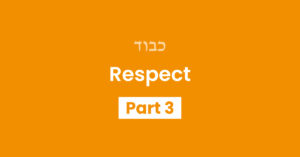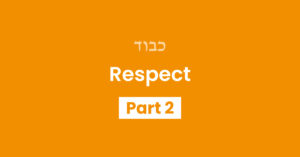We have spent this past month focusing on the middah of Kavod – treating our friends with respect. First, we explained that the key to treating people with respect is recognizing the every person matters. Every person has the power to affect the physical and spiritual worlds through their mitzvos and aveiros, and every Jew is so very precious to Hashem.
Next, we focused on the fact that every person has specific ways in which they are greater than other people. For example, my friend might be smarter, more organized, or more easygoing than I am. When I recognize the ways in which someone else is greater than me, I am required to treat them with honor.
Finally, we discussed one very powerful way to treat people with Kavod: greeting them with a smile. When we make an effort to notice other people and acknowledge their presence with a smile and friendly greeting, we are showing them – and also reminding ourselves – that they are important and valuable human beings.
In the Image of G-D
Aside from the factors mentioned above, there is an additional reason why every human being must be treated with respect: Every person was created “B’Tzelem Elokim (in the image of G-d)”1.
Every person was created “B’Tzelem Elokim (in the image of G-d)”
What does this mean?
As we explained earlier, the word “Elokim” means “power” – so one way to explain “Tzelem Elokim” is that every person has the “power” to affect the world through their mitzvos and aveiros. But many commentaries give a different explanation:
Being created “in the image of G-d” means that every person has the potential to be like Hashem.2 Just as Hashem is kind, loving, merciful, and just, human beings can also learn to be kind, loving, merciful, and just. Just as Hashem loves to do chessed, human beings can also develop themselves into people who love to do chessed.
Every person has the potential to be like Hashem.
When we look at certain people, it can be hard to see the goodness inside. Maybe it’s your grouchy neighbor who often complains about your overgrown lawn. Maybe it’s the guy behind you in shul who gets on your nerves because he talks during davening and doesn’t seem to care about his effect on anyone else. Maybe it’s your classmate who bosses everyone around and thinks she is the greatest.
It may seem as if some people are despicable or unworthy of respect. But the truth is that no matter how mean or inconsiderate they seem to be, every person has a Neshama (soul) inside, which gives them the potential to be great like Hashem.
Do we mistreat a baby because he cries and screams all day, and isn’t producing anything worthwhile for society? Of course not! We recognize that even though I don’t see it now, this baby has tremendous potential. Maybe he will grow up to become a great Talmid Chochom, a tremendous Baal Chessed, or “just” a regular sincere Jew. Even though we might not be able to see it now, every person has the potential to achieve great things.
Maybe your neighbor is grouchy now, but one day he will realize the importance of having a positive attitude, and he will gradually change his attitude. Maybe your classmate is bossy now, but when she gets a little older, she will learn how to be more sensitive to others. We can never know for sure how other people are going to grow over time, but we can certainly remember that every person has the potential to grow, simply because they were created B’Tzelem Elokim – in the image of Hashem.
Man vs. Animal
This incredible potential for growth is actually hinted to in the name “Adam” which means “man.” The word “Adam” (אדם) comes from the same root as “Adamah” (אדמה) which means the ground. But Adam also comes from the same root as “Adameh” (אדמה) which means “I can become similar to.” This dual meaning hints to the fact that even though man’s body comes from the lowly earth, he can grow and work on himself to become great like Hashem.3
This dual meaning hints to the fact that even though man’s body comes from the lowly earth, he can grow and work on himself to become great like Hashem.
By contrast, the Hebrew word for “animal” is “Beheimah” (בהמה) which can be split into 2 words: “Bah mah” (בה מה) – everything that it has, is inside of it already.4 Animals do not change over time. What you see is what you get. If a cow is grazing and moo-ing today, then it will continue to graze and moo tomorrow.
But human beings are different. Human beings start out as a lowly clump of dirt made from the earth, and then grow and change over time to become loving and giving, like Hashem. This is the essential difference between man and animal, and this potential to grow is what gives every human being value. A cow will always be a cow, but human beings have the potential to become G-dly.
A cow will always be a cow, but human beings have the potential to become G-dly.
We can now understand why a passuk in Tehillim5 refers to the Neshama (soul) as “kavod” (honor). Without the neshama, a person would just be a clod of dirt that is shaped into bones and limbs. But the addition of a Neshama is what makes the body into something honorable.6 Our soul is what gives us value, because our soul gives us the power of free will – the power to choose actions that emulate Hashem’s kindness, righteousness, and ability to forgive – or chas veshalom, actions that reflect the opposite.
As we end this month of Iyar and move on to focus on a different middah next month, let’s remember that every person has the potential to become great like Hashem, because every person was created B’Tzelelm Elokim – in the image of G-d. When we remember this, we will realize that every person has tremendous value, and treat them with the respect and honor they deserve.
Sources: [1] Bereishis 1:27; [2] See HaKtav V’Hakabbalah on Bereishis 1:26, Michtav Mei’Eliyahu Vol. 3 pg. 257, and Daas Torah: Shemos pg. 257; [3] Shlah HaKadosh: Beis Yisroel 15; [4] Kavod (Part 2): The Health of Recognition by Rabbi Chaim Dov Stark; [5] See Metzudas Tziyon on Tehillim 57:9; [6] Kavod (Part 2): The Health of Recognition by Rabbi Chaim Dov Stark
Your Challenge
Once a day, do something to show respect and honor for another person.
FOR EXAMPLE:
- Say hello to another person while thinking: “This person is valuable.”
- Do a favor for someone.
- Hold the door open for someone.
- Give someone a compliment.
- Smile at another person while thinking: “This person has the potential to be kind, loving, and giving, just like Hashem.”
- Listen fully while someone is speaking to you.





